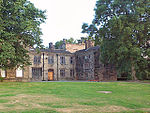Bowling Junction railway station
Disused railway stations in BradfordFormer Lancashire and Yorkshire Railway stationsPages with no open date in Infobox stationRailway stations in Great Britain closed in 1951Railway stations in Great Britain opened in 1902 ... and 2 more
Use British English from November 2016Yorkshire and the Humber railway station stubs

Bowling Junction railway station is a closed station in the city of Bradford, West Yorkshire, England. It was situated on the Calder Valley line to the south of Bradford Exchange.
Excerpt from the Wikipedia article Bowling Junction railway station (License: CC BY-SA 3.0, Authors, Images).Bowling Junction railway station
Birch Lane, Bradford West Bowling
Geographical coordinates (GPS) Address External links Nearby Places Show on map
Geographical coordinates (GPS)
| Latitude | Longitude |
|---|---|
| N 53.775342 ° | E -1.74846 ° |
Address
Bowling Junction
Birch Lane
BD5 8PE Bradford, West Bowling
England, United Kingdom
Open on Google Maps








